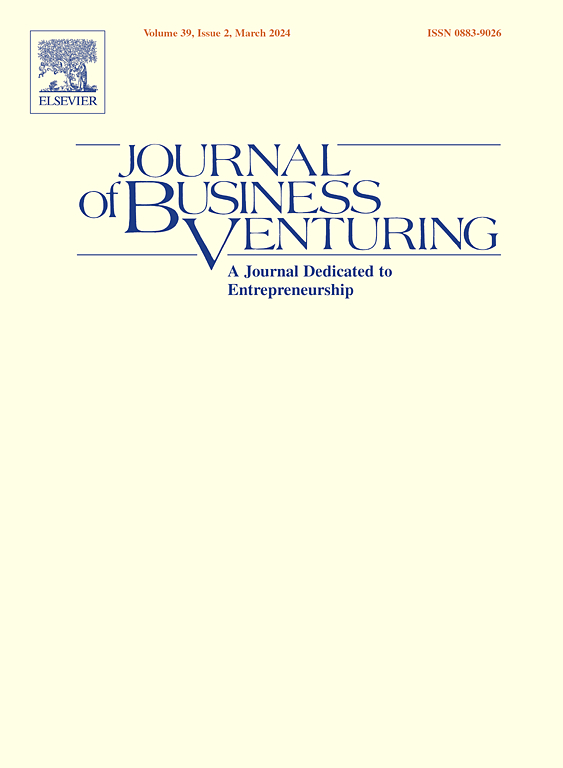Balancing power: The role of independent directors on venture boards
IF 8.9
1区 管理学
Q1 BUSINESS
引用次数: 0
Abstract
We develop a novel power-centric model that examines antecedents and boundary conditions for independent directors in venture boards. Using 989 U.S. biotech and pharmaceutical ventures from 2010 to 2020, we find that the structural power gap between inside directors and VC directors is negatively associated with venture board independence. We also find that VC directors' intra-group conflict through tenure variance would weaken the impact of VC directors' power over inside directors on venture board independence, while VC ownership power through investment would strengthen it. These results offer a deeper theoretical understanding of venture boards.
Executive summary
The role of independent directors on venture boards—privately owned, professionally funded firms—remains underexplored in academic literature. While independent directors in public firms are primarily tasked with monitoring executives and protecting shareholders, their role in ventures is less defined. In VC-backed ventures, CEOs are often aligned with the firm's goals, and major shareholders have direct representation on the board through venture capitalist (VC) directors. The traditional agency problem, which necessitates independent directors in public firms, is absent in this context. Yet, independent directors make up about 20 % of venture boards, prompting a key question: Why do VC-backed ventures include independent directors?
This paper develops a power-based theoretical model to explain the inclusion of independent directors on venture boards. Based on organizational power theory, board seats represent structural power, with inside directors (e.g., the CEO and key executives) and VC directors as the dominant groups. These groups often have divergent priorities—VC directors emphasize short-term financial returns, while inside directors focus on long-term growth and innovation. When power is imbalanced, the dominant group resists the addition of independent directors. However, when the power gap between the two groups is smaller, conflict and stalemates become more likely, creating a need for independent directors to mediate and restore board functionality.
The paper also identifies two critical contingencies that shape this dynamic. The first is the intra-group power dynamics among VC directors. High tenure variance within the VC group reduces cohesion and alignment, weakening their collective power. This diminished unity increases the likelihood of independent directors being added to balance competing interests. The second contingency is the external investors' influence: Greater VC investment aligns VC directors more closely with external investors, amplifying their collective power relative to inside directors. This increased power advantage reduces the perceived need for independent directors.
The study's findings, based on an analysis of 989 U.S. biotech and pharmaceutical ventures from 2010 to 2020, provide strong empirical support for this model. By highlighting the power-balancing role of independent directors, the paper offers a new political perspective on venture board composition. For practitioners, these insights underscore the strategic value of independent directors in fostering effective governance, especially in ventures where power dynamics between inside and VC directors are finely balanced. Entrepreneurs can proactively leverage independent directors to mitigate conflicts and improve board decision-making. For VCs, recognizing how intra-group dynamics and investment levels influence governance structures can help shape more effective board strategies. To conclude, by answering the question of why ventures include independent directors, this paper not only advances governance theory but also provides actionable guidance for practitioners navigating the complexities of venture boards.
平衡权力:独立董事在风险投资董事会中的作用
我们建立了一个新的权力中心模型,考察了独立董事在风险投资董事会中的先决条件和边界条件。利用2010 - 2020年989家美国生物技术和制药企业的数据,我们发现内部董事和风险投资董事之间的结构性权力差距与风险投资董事会独立性呈负相关。我们还发现,风险投资董事通过任期差异产生的集团内部冲突会削弱风险投资董事对内部董事的权力对风险投资董事会独立性的影响,而通过投资产生的风险投资所有权权力则会增强风险投资董事对内部董事的权力对风险投资董事会独立性的影响。这些结果为风险投资董事会提供了更深入的理论理解。在学术文献中,独立董事在风险投资董事会(私人拥有的、专业资助的公司)中的作用仍未得到充分探讨。虽然上市公司的独立董事的主要任务是监督高管和保护股东,但他们在合资企业中的角色却不那么明确。在风投支持的企业中,首席执行官通常与公司的目标保持一致,大股东通过风投董事在董事会中有直接代表。在这种背景下,传统的代理问题不存在,而独立董事是上市公司的必要条件。然而,独立董事约占风险投资董事会的20%,这引发了一个关键问题:为什么风投支持的企业会有独立董事?本文建立了一个基于权力的理论模型来解释独立董事进入风险投资董事会的原因。根据组织权力理论,董事会席位代表着结构性权力,内部董事(如CEO和关键高管)和VC董事是主导群体。这些团体往往有不同的优先事项——风投董事强调短期财务回报,而内部董事则关注长期增长和创新。当权力不平衡时,主导集团会抵制独立董事的加入。然而,当两个集团之间的权力差距变小时,冲突和僵局就更有可能发生,这就需要独立董事来调解和恢复董事会的功能。本文还指出了影响这一动态的两个关键偶然因素。首先是风险投资董事之间的集团内部权力动态。风险投资集团内部的高任期差异降低了凝聚力和一致性,削弱了他们的集体权力。这种削弱的统一性增加了独立董事加入的可能性,以平衡相互竞争的利益。第二个偶然性是外部投资者的影响:更大的风险投资使风险投资董事与外部投资者更紧密地联系在一起,放大了他们相对于内部董事的集体权力。这种权力优势的增加减少了对独立董事的需求。研究结果基于对2010年至2020年989家美国生物技术和制药企业的分析,为该模型提供了强有力的实证支持。通过强调独立董事的权力平衡作用,本文为风险投资董事会构成提供了一个新的政治视角。对于从业者来说,这些见解强调了独立董事在促进有效治理方面的战略价值,特别是在内部和风险投资董事之间权力动态微妙平衡的企业中。企业家可以主动利用独立董事来缓解冲突,改善董事会决策。对于风投来说,认识到集团内部动态和投资水平如何影响治理结构,有助于制定更有效的董事会战略。综上所述,通过回答为什么风险投资包括独立董事的问题,本文不仅推进了治理理论,而且为从业者驾驭风险投资董事会的复杂性提供了可操作的指导。
本文章由计算机程序翻译,如有差异,请以英文原文为准。
求助全文
约1分钟内获得全文
求助全文
来源期刊

Journal of Business Venturing
BUSINESS-
CiteScore
16.70
自引率
6.90%
发文量
59
审稿时长
77 days
期刊介绍:
The Journal of Business Venturing: Entrepreneurship, Entrepreneurial Finance, Innovation and Regional Development serves as a scholarly platform for the exchange of valuable insights, theories, narratives, and interpretations related to entrepreneurship and its implications.
With a focus on enriching the understanding of entrepreneurship in its various manifestations, the journal seeks to publish papers that (1) draw from the experiences of entrepreneurs, innovators, and their ecosystem; and (2) tackle issues relevant to scholars, educators, facilitators, and practitioners involved in entrepreneurship.
Embracing diversity in approach, methodology, and disciplinary perspective, the journal encourages contributions that contribute to the advancement of knowledge in entrepreneurship and its associated domains.
 求助内容:
求助内容: 应助结果提醒方式:
应助结果提醒方式:


